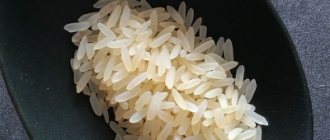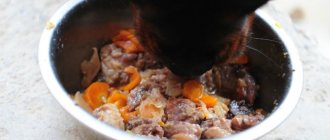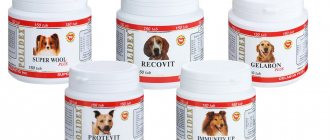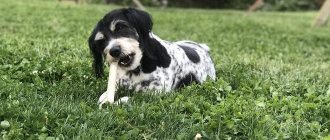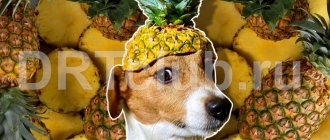A dog's appearance is a fairly accurate indicator of its health. If the dog's fur has become dull, brittle, has begun to fall out, or the period of seasonal molting has been prolonged excessively, the pet should be taken to the veterinarian. It happens that baldness or a sloppy appearance of an animal is caused by a serious illness, but most often the root of the problem lies in an unbalanced diet, which leads to a lack of the necessary substances in the pet’s body.
Animals that are fed cheap industrial feed or “human” food usually suffer from a lack of vitamins and microelements - such nutrition cannot fully satisfy the dog’s needs. High-quality ready-made diets of the holistic and super-premium classes have a balanced composition and contain all the substances a dog needs, but they may not be suitable for the pet due to changes in its condition - then the food needs to be replaced or supplemented with vitamin and mineral complexes.
In order for the dog to look healthy and well-groomed, he must receive the following vitamins with food:
- A (Retinol) - promotes the production of keratin and collagen in the body, gives the coat shine and elasticity.
- D (Calciferol) - accelerates hair growth, eliminates redness, itching and other skin problems.
- PP (Nicotinic acid) - makes the color brighter.
- B - vitamins of this group regulate the production of fatty secretions and stimulate the growth of hairs.
- Omega polyunsaturated acids make the coat thick, smooth and shiny.
This is not a complete list of nutrients a dog needs, but only a veterinarian can determine what exactly is missing in an animal’s body. You should not prescribe vitamin supplements to your pet on your own without consulting a specialist - hypervitaminosis can lead to serious illness and even death of the dog.
Recommendations for choosing vitamins and minerals
What is included in vitamin complexes?
- water-soluble vitamins: C (ascorbic acid), B1 (thiamine), B2 (riboflavin), B3 (PP, niacin), B5 (pantothenic acid), B6 (pyridoxine), B12 (cyanocobalamin), H (biotin).
- fat-soluble vitamins: A (retinol), D3 (cholecalciferol), E (tocopherol), K3 (menadione).
- macroelements: sodium, chlorine, calcium, phosphorus, potassium, magnesium.
- trace elements: iodine, cobalt, iron, zinc, manganese.
- amino acids: glycine, tryptophan, valine, phenylalanine, leucine, threonine, lysine, methionine, arginine, isoleucine, glutamine, histidine.
- chondroprotectors: glucosamine and chondroitin sulfates, hyaluronic acid.
When choosing a supplement for your pet, consider:
- breed: large (A, D, B6) or miniature (B2, B5), short- or long-haired (A, H, D, C, E, PP, group B);
- age: puppy (A, B2, B6, B12, C, D3, E), adult (B3, B12), old (A, B, E);
- activity: active or sedentary, working, sports (A, D3, E, K, group B, C, H, );
- health: general condition, period after illness (C, A, D, K, group B), inherent “weaknesses” of the breed;
- physiological state: pregnant or lactating bitch (B1, B9, E), molting (group B, H), sterilized.
Symptoms of vitamin deficiency
- A: important for the eyes, deficiency leads to night blindness, diseases of the skin and mucous membranes, pathological changes in the bones, decreased immunity, diseases of the reproductive organs.
- B1: dysfunction of the nervous system in Dobermans, mastiffs and other large dogs, slow growth of puppies; loss of appetite, impaired carbohydrate metabolism and water balance.
- B2: slow growth of puppies, diarrhea, food is poorly digestible.
- Q3: puppies have growth retardation, diseases of the digestive system; in adults, “black tongue”, ulcers and inflammation of the mucous membranes, joint diseases; especially important for small breeds.
- B5: gray hair, discolored skin, hair loss, ulcerations of the walls of the stomach and intestines, fatty liver, hormonal disorders, convulsions, low stress resistance.
- B6: heart and liver diseases, disorders of the nervous system, dwarfism; skin inflammation in predisposed breeds.
- B12: puppies grow poorly, adults do not digest proteins well: anemia, poor coat, skin diseases.
- C: decreased immunity, slow healing of wounds when docking ears and tail.
- D3: skeletal deformities, growth retardation; the deficiency is critical for large breed puppies.
- E: skeletal muscle dystrophy, cardiac muscle degeneration; the deficiency is critical for adult working and sporting breeds.
- N: growth retardation, dull, diseased coat, depigmentation, eczema, eye diseases, anemia, lethargy.
- K3: prolonged bleeding even with minor injuries.
Here is a short video on how to choose the right vitamins for your dog.
Immune organs
After we have examined the concept of immunity and its main types, it is necessary to pay attention to the organs that provide it.
There are central and peripheral organs of the immune system.
The central ones include:
- Red bone marrow. Found in bones. Serves as a source of formation of all blood cells, including cells of the immune system.
- Thymus. It further matures some of the immune system cells coming from the red bone marrow.
Peripheral organs:
- Lymph nodes.
- Spleen.
- Accumulations of lymphoid cells in the skin, respiratory organs, and intestines.
Vitamins when feeding natural or food
If you feed your pet with ready-made food, then you know that it has the necessary set of vitamins, but this only applies to premium, super premium and holistic food classes. Inexpensive economy foods do not balance vitamins as carefully as expensive ones; they cannot provide dogs with these substances. Therefore, special additives are simply necessary.
If you want to feed your pet natural food, you will have to provide it with vitamins and micro- and macroelements yourself, according to its age and physiological condition. Monitor the composition of the food, give your pet additional vitamin supplements when the need for them increases (molting, cold, growth, pregnancy, lactation, stress, physical activity).
Vitamins for wool
Wool is the very first indicator of hypovitaminosis in dogs: it thins, turns pale, and becomes dull even outside of the molting period. Buy multivitamins with sulfur, biotin and zinc.
8 in 1 Excel Brewer's Yeast
The source of “wool” vitamins are brewer’s yeast, fish oil, garlic, fatty acids are also included; In addition to healthy skin and coat, the complex supports immunity and normal metabolism.
The only disadvantage is the high price.
Beaphar Laveta Super
Special complex against hair loss, itching and dandruff. Reduces the molting period.
Disadvantages: not available everywhere, high price.
Vitamins for bones and joints
They are especially needed by dogs during their growth period, old, athletic dogs, as well as dogs with a breed predisposition to joint diseases (dachshunds, basset hounds).
Wolmar Pro Bio Ga-Glican
Recommended in the treatment of inflammation and degenerative joint diseases, with increased physical activity; contains enzymes, chondroprotectors (with chondroitin), immunomodulators and weight-regulating substances.
Cons: expensive complex, does not always help with serious problems.
TRM Stride Plus
Chondroprotector, suitable for the treatment of inflammation and degenerative changes in joints.
Cons: dogs don’t eat it well, inconvenient release form, high price.
Release forms
On the websites of veterinary stores there are photographs of vitamins for dogs in the following dosage forms:
- Pills;
- Powders;
- Elixirs and suspensions;
- Treats;
- Injections.
Tablets are the most popular type. In order for the animal to “take” the medicine without problems, beef, poultry and flavor enhancers are often added to it. Preparations for puppies and adult dogs vary in shape and size.
Powders are added to food. These products are not suitable for dogs eating dry food.
Suspensions and elixirs can be added to water, any type of feed, or directly into the animal’s mouth.
Pets really like treats, although in principle these are not vitamins, but feed additives, the therapeutic effect of which is extremely low. Most often they are used to reward animals during training.
For intramuscular use, veterinarians prescribe injections. Injections can only be used as prescribed by a doctor. Their advantage is rapid and complete absorption, but the disadvantage is the painful process of the procedure.
Vitamins for puppies
Small breeds
Polidex Polivit-Ca
Improves calcium-phosphorus metabolism of puppies and their mother, promotes the formation of normal bone tissue in puppies, protects the mother’s bones from destruction.
Cons: dogs eat without pleasure, dear ones.
Large breeds
8 in 1 Excel Multi Vitamin Puppy
11 vitamins and 10 minerals together promote growth, support the proper development of bones, teeth, immunity, nervous system, and stress resistance.
Disadvantages: high price, tablets crumble, inconvenient dosage (difficult to divide into shares).
8 in 1 Excel Calcium
Calcium supplement to feed + vitamin D3 and phosphorus for better absorption; It is recommended to combine with other multivitamins.
Disadvantages: only large packages, the dog cannot swallow large tablets.
Types of immunity
Immunity includes humoral and cellular immunity. Let's look at each of them in more detail. Humoral is ensured by the presence of antibodies (substances that bind to antigens) in the blood. Cellular is provided by cells of the immune system. Immunity can be congenital or acquired. In turn, the acquired one can be active or passive. Active develops after illness, for example, ARVI. It also forms after vaccination. Passive is formed when ready-made antibodies are transfused into the body in the form of serum. It also develops when antibodies are passed from a mother's milk to her newborn baby. In fact, natural immunity includes congenital immunity, acquired after an illness, as well as passive immunity during the transfer of antibodies from mother to baby. Artificial immunity is called immunity after the introduction of a vaccine or serum with antibodies.
Vitamins for adult dogs
Large breeds
AniVital CaniAgil
It has a completely natural composition. Protects cartilage and bones of large, hunting and other working dogs, animals with diseases of the musculoskeletal system and old ones.
Cons: very high price.
Beaphar Doggy's Mix
The complex consists of three types of tablets: with taurine and biotin, with protein, and with liver. Can be used as a reward and treat.
Disadvantages: none.
Small breeds
8 in 1 Excel Multi Vitamin Small Breed
Satisfies the great need of miniature dogs for vitamins (especially B2 and B4) and other substances, taking into account their accelerated metabolism; small tablets.
Cons: high price, contains no calcium, not suitable for breeds prone to obesity.
Wolmar Pro Bio Booster Ca Mini
Affects the digestive system and absorption of nutrients by normalizing intestinal microflora, strengthens bones.
Disadvantages: not always on sale.
Features of the formation of immunity in children
The formation of immunity in children has its own characteristics depending on age.
A feature of the formation of the immune system in children is the presence of so-called “ critical ” periods:
- The first critical period after the birth of a baby is the neonatal period. At this time, the baby encounters a huge number of pathogens. The immune system during this period is subject to strong immunosuppressive effects. This period is characterized by low resistance to many infections. There is a tendency to develop common infections.
- The second period occurs at the age of 3-6 months. It is characterized by a weakening of immune reactions due to the destruction of antibodies that were transmitted from the mother.
- The third period develops in the second year of life. During this period, the baby's contact with the outside world increases significantly. At this age, many abnormalities of the immune system appear, as well as autoimmune (directed against one’s own body) diseases. Children are prone to repeated acute respiratory infections.
- The fourth period occurs in the 4th-6th years of life. This period is characterized by a high prevalence of allergic and parasitic diseases. During this period, many chronic diseases develop.
- The fifth period occurs during adolescence. For girls this corresponds to 12-13 years old, for boys - from 14-15 years old. A large growth spurt is accompanied by a decrease in the mass of lymphoid (immune) organs. An increase in the formation of male sex hormones leads to a decrease in the cellular component of immunity. In this regard, many allergic diseases are weakened. The influence of the external environment on the development of immunity is increasing. At this time, there is a new rise in the incidence of chronic inflammatory, autoimmune, and viral diseases.
The processes of formation of the immune system in children can slow down under the influence of various external factors:
- Xenobiotics (chemicals).
- Intrauterine infections
- Frequent ARVI and digestive tract infections.
- The influence of environmental environmental factors and many others.
Some external factors can slow down the development of the immune system in children.
These factors, which slow down the formation of the immune system in children, lead to functional immaturity of the immune system and, accordingly, predispose them to the development of immunodeficiency states (a state of reduced immunity).
Vitamins for older dogs
Polidex Gelabon Plus
Indispensable in the nutrition of aging, growing and athletic dogs; strengthens bones, eliminates incorrect paw placement, ear position, and prevents hip dysplasia.
Cons: the composition is “poorer” than that of analogues (Gelacan Chondrocan).
8 in 1 Excel Multi Vitamin Senior
Designed for old (more than five years old) dogs, therefore it takes into account their reduced need for minerals and increased need for fatty acids, slow metabolism, reduced immunity, poor absorption of vitamins.
Disadvantages: possible allergies.
Reviews
The opinion of veterinarians
Multivitamin complexes are necessary for every dog that eats “natural” or inexpensive “dry” food. All vitamins are already included in expensive food, so adding anything else to such a diet is not only useless, but also dangerous.
First of all, this concerns retinol and calciferol: they are contained in all supplements. Their excess affects behavior and health.
In each case, the supplement should be selected in conjunction with your veterinarian, taking into account the needs of the individual dog. If an adult dog is not pregnant, is not sick and does not shed, then vitamins for it should be purchased twice a year: in autumn and spring. The best seasonal feedings are gentle fortified pads.
Dog owners say
Violetta: “The dog always shed heavily and looked terrible: the hair came out in clumps, the remaining hair was dry, and the skin deteriorated. The 8 in 1 Excel Brevers Yeast complex restored the dog’s coat and helped to forget about this problem. The wool has a shine."
Mikhail: “I buy my dog 8 in 1 Excel Multi Vitamin Small Breed. It costs 450 rubles for 70 tablets, but the package lasts for 140 days for my little Chihuahua weighing four kilograms. All vitamins and minerals are there. The fur does not fall out, it has become brighter. I give half a tablet a day, crumble it into food.”
Sergey: “My Rottweiler doesn’t eat just anything all his life. Over the years, Jack's joints began to hurt, especially after resting immobile. At the insistence of the veterinarian, he bought Doggy's Senior vitamins from Beaphar, and Jack even began to eat them. The dog cheered up, began to be active, can go for long walks again, and his appetite has returned. We're walking a lot in the forest again."
Conclusions: choosing the best complex
There is no point in taking an expensive fortified wool supplement hoping for a better effect. Often, cheap domestic analogues are not inferior in quality and composition to expensive foreign drugs.
Universal means
Among the inexpensive drugs I recommend:
- Brewer's yeast ;
- Phytomins hypoallergenic complex;
- 8 in 1 Excel Brewers Yeast.
But you won’t be able to find a budget complex with Omega fatty acids from natural ingredients. You will have to pay 1-2 thousand rubles for one of the following additives:
- Canina Petvital Derm;
- Hokamix Skin & Shine;
- Virbac Megaderm;
- Anivital CaniDerm.
Individual recommendations
The best therapeutic and preventive supplements:
- for skin diseases: Phytomins, Phytoelite, Canina Petvital Derm, Hokamix Skin & Shine;
- for pregnant and lactating bitches: 8 in 1 Excel Brewers Yeast, Beaphar, Canina Petvital Derm;
- for large dogs: 8 in 1 Excel Brewers Yeast;
- for puppies: Beaphar (from 2 months), Brewer's yeast "Vaka", Polidex Super Wool Plus (from 4 weeks)
- for allergy sufferers: 8 in 1 Excel Brewers Yeast, Phytoelite, Hokamix Skin & Shine, Phytomines;
- for the elderly: Canina Petvital Derm;
- for show and longhair: Polidex Super Wool Plus, Hokamix Skin & Shine, Canina Petvital Derm.
If the dog is healthy, and you just want to increase the shine of its coat, there is no need to constantly feed your pet with dietary supplements. Give her complexes seasonally, during coat changes. And I strongly advise you to introduce feed sulfur and brewer’s yeast during molting - they will facilitate the process.
But if you suspect any disease, select a nutritional supplement together with your veterinarian. Remember that it takes a couple of months to make up for the lack of vitamins, but an excess of organic substances can lead to serious pathologies with fatal consequences. Therefore, we give any drug carefully, based on tests and doctor’s recommendations.
Briefly about the main thing
- As a rule, a dog on economy-class “drying” and natural food does not have enough vitamins, so it needs additional multivitamin complexes.
- An excess of vitamins in the tissues of the body is just as dangerous as a deficiency.
- At different ages and in different conditions, a dog needs special vitamins and minerals.
- You can tell that a dog has hypo- or vitamin deficiency by the condition of its coat and skin, general health, appetite, and activity.


